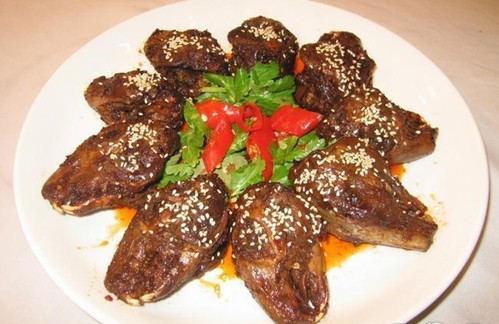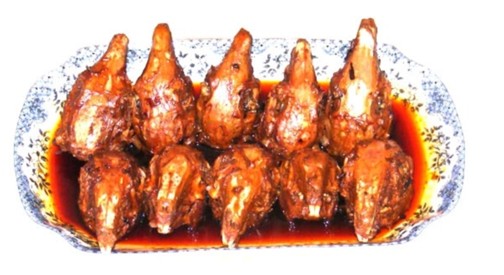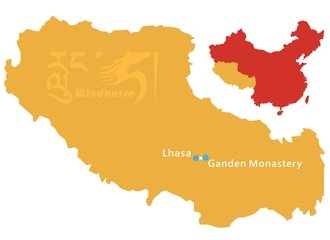Rabbit Head: Chengdu delicacy, an unusual meal for Foodies

In China, we have the following saying: 吃在中国 味在四川 - "Food is in China, but flavor is in Sichuan." I bet you couldn't agree more after tasting rabbit head on your next visit to Chengdu, China - the epicenter of world-famous Sichuan cuisine!
Chengdu is celebrated worldwide for its rich and diverse culinary landscape. Renowned as a UNESCO City of Gastronomy, Chengdu's cuisine is a delightful exploration of flavors, textures, and culinary techniques. This region's cooking hallmark is the Sichuan pepper, known for its unique numbing sensation, paired with bold spices and various fresh, local ingredients.
From bustling street food stalls to elegant fine-dining restaurants, Chengdu offers an array of gastronomic experiences. Signature dishes such as Mapo Tofu, Kung Pao Chicken, and Sichuan Hotpot showcase the intricate balance of spicy, sweet, sour, and savory flavors. Street foods like Dan Dan Noodles and Sichuan-style skewers provide a quick yet authentic taste of local flavors.
Besides its famous spicy dishes, Chengdu's cuisine also offers subtler flavors, catering to a wide range of palates. Vegetarian dishes, often inspired by Buddhist traditions, are an integral part of the culinary scene, featuring fresh vegetables and tofu prepared innovatively.
Eating in Chengdu is not just about the food; it's a cultural experience. The city's teahouses, an essential part of local life, offer a glimpse into the relaxed and social aspects of Chengdu's lifestyle. Tea is often accompanied by Sichuan opera performances, making dining a multisensory experience.
Every dish in Chengdu is special, but the most special is Rabbit Head.
Rabbit head is a local delicacy in Chengdu, and though the dish probably sounds shocking and grotesque at first, if you get over your squeamishness and give this local specialty a try, you won't regret it - the flavor is phenomenal!

Preparing the Rabbit Head delicacy of Chengdu
The Sichuan rabbit head recipe is an involved process: first, the rabbit head should be blanched in hot water and then soaked in a mixture of salt, cooking wine, and ginger powder for 12 hours. After that, it can be stewed in any number of flavorings, such as cinnamon, fennel, or chili over a high flame for 10 minutes or so, and finally steeped in the flavoring for a few hours to ensure that the meat of the rabbit skull absorbs the flavor.
After all that, the finished rabbit head dish is ready to be served, usually seasoned with sesame and chili powder. Eating rabbit heads requires skills much like those used when eating crab or lobster. To get all the meat, those enjoying this Chinese delicacy must give special attention!

How to Eat and where to buy Rabbit Heads
When you are on a Chengdu food tour, nearly every street in Chengdu, China, has street vendors and small restaurants selling their unique flavor of rabbit heads, but the most authentic rabbit head restaurant is "Old Mother from Shuangliu's Rabbit Head," located near the Shuangliu Old Station.
Head in Chengdu for a rabbit skull, but keep in mind that this delicacy is not the leading food, but a supplement, an activity, a snack, or a food enabler of drinking - just like Chicken wings. In Chengdu, meals play an important cultural and social role, and by slowing down, you show respect to the food. Take your time to enjoy the delicacy of China and disconnect from your day.
Meals of the old Sichuan cuisine are supposed to take time, to be consumed slowly and be enjoyable. Active snacks like Chinese rabbit heads and duck necks allow people to extend eating time and gnaw or chew their way through the spicy flavors. Chengdu Rabbit cuisine is for the people not looking to run away from the dinner table and wondering where to eat in Chengdu next. Why leave the bunny food party as the American's call it here in the Sichuan province.
Rabbit Head origins
As the story goes, "old mother" was selling hot pot at her shop in Shuangliu (home of Chengdu's airport today), but her son liked eating Chengdu rabbit head so much that his loving mother also made rabbit head food in her homemade sauce especially for him. The customers coming to her small hot pot restaurant heard of her homemade rabbit head dish and went crazy for it when they got a taste. From that point on, she shifted her business from hot pot to her special rabbit head delicacy, and its popularity soon took off throughout Chengdu and around China. These spicy rabbit heads can now be found as street food in Hong Kong.
Next time you are in Chengdu on a tour of Sichuan, China, the capital of world-famous Sichuan cuisine, don't be afraid of trying new and unusual foods like the Rabbit Chengdu specialties - it's all part of the experience!
Related Tours














